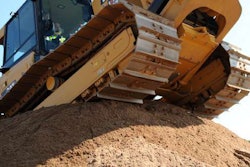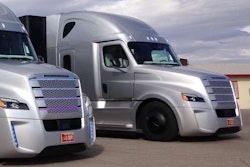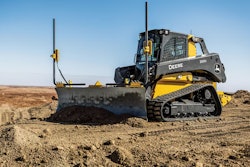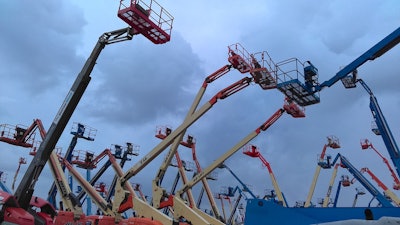
Construction equipment dealers will be able to take advantage of full expensing – for both new and used equipment – under the final tax bill.
There’s also a lower rate for most pass-throughs, including trusts and estates. And business interest deductibility is initially capped at 30 percent of earnings before interest, tax, depreciation and amortization (EBITA), says Daniel Fisher, vice president of government affairs for Associated Equipment Distributors.
With voting along party lines, the Republican majority Congress passed the $1.5 trillion tax overhaul bill this week and sent it to President Donald Trump for signing into law, likely before Christmas.
“As with any large piece of legislation, there’s going to be some good and some bad, but overall, construction equipment dealers came out very well,” Fisher tells Equipment World.
The final U.S. tax bill contains significant benefits for the entire industry, including customers and manufacturers. Yet there’s troubling aspects for dealers, too.
“Despite the bill having many beneficial provisions, most are temporary and we’re going to wind up fighting in the next couple of years to make them permanent,” Fisher says.
“One of our biggest concerns is over the temporary nature of key provisions. There’s not a lot of certainty there. The expensing provision is in place until 2022, before it gradually decreases and phases out entirely by 2027,” he explains.
“We’re told that Congress may extend full expensing or they may not. We just don’t know.”
A provision providing a fairly significant deduction, 20 percent, on pass-through income for businesses was key for members of the AED because most construction equipment dealers are structured as pass-throughs, Fisher notes.
(Pass-through entities are businesses that don’t pay the corporate income tax or any entity-level tax. Instead, the profits are passed through to the owners of the business.)
This tax relief is set to expire in 2025. “You have seven years of the lower pass-through rate before it’s going to jump back up,” Fisher says. “Without congressional action, it will return to current levels.”
Construction equipment dealers can take full expensing
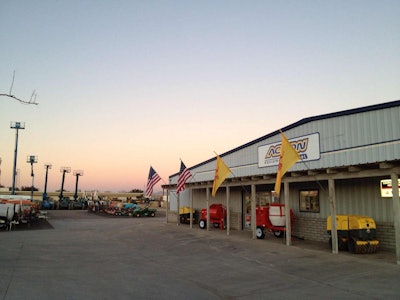 The Action Equipment rental yard in Las Cruces, New Mexico.
The Action Equipment rental yard in Las Cruces, New Mexico.AED took issue with a provision in the House bill that would have “carved out” construction equipment dealers from being able to take full expensing. AED represents companies involved in the sale, rental, and servicing of construction, mining, energy, forestry and industrial equipment.
It seems the House lawmakers had good intentions, Fisher says, but they didn’t fully understand that construction equipment dealers have differing business models than ag-equipment dealers and others. Construction equipment dealers maintain significant rental fleets that require large amounts of capital investment, which full expensing is designed to facilitate, Fisher says.
Ag-equipment dealers don’t typically rent out as much equipment as do construction equipment dealers.
The Equipment Dealers Association (EDA), which represents largely farm equipment dealers, sought an exception to caps that would limit deductions of business interest. Ag-equipment dealers were granted that eleventh-hour exception, but were forced to forego the bill’s full expensing provision in exchange.
They had hoped that the House’s “carving out” exception would remain as conferees hammered out differences between the House and Senate bills to produce the nation’s final tax code on Dec. 15. It did.
Construction-equipment dealers, however, had vigorously rejected that provision because with it, they would not have been able to take advantage of another provision that allows them to expense 100 percent of costs of purchasing inventory, especially for rental fleets.
The “dealer floor-plan provision” allows a select group of dealers to deduct a higher amount of business interest deductions attributed to floor planning inventory. But under the provision, dealers are prohibited from getting full expensing, Fisher says.
The Senate offered a fix before passing its legislation, omitting “construction equipment and machinery” from the language of the provision.
“We were able to fix that in the final bill, so construction equipment dealers will be able to take advantage of the full expensing provision, which isn’t just limited to new equipment – it’s now for new and used purchases. This is big and particularly beneficial for our customers who are buying used equipment more and more,” Fisher says.
“Contractors want to rent more and our members are carrying significant rental fleets, so the full expensing should be a huge benefit.”
For those equipment dealers with both construction and farm equipment, it’s a more complex issue. “That’s why we were really pushing for an option” that would afford dealers flexibility, Fisher says.
“We were fully supportive of a choice but our first priority was to make sure that we weren’t included in any mandatory carve-out that would prevent our members from taking advantage of the full expensing provision.”
Construction equipment dealers lobbied over business interest deductions, too
Construction equipment is expensive, and dealers and their customers borrow heavily to finance equipment acquisition.
AED called for conferees to adopt the House bill’s limitation on business interest deductions of 30 percent of EBITDA, and to allow for excess interest expense to be carried forward indefinitely.
The final bill caps business interest at 30 percent of EBITDA through 2021. After that, it changes to a 30 percent of EBIT formula.
“We prefer it to be permanent at 30 percent of EBITDA, but the fact that we have it for the near term means we can at least fight for keeping it.” Fisher says.
Repeal of Like-Kind Exchanges
AED also fought the repeal of LKE for personal property, particularly construction equipment. That repeal is now permanent, but AED will be lobbying in the future for its restoration, Fisher said.
In the equipment industry, distributors have used LKE to help manage the tax consequences of buying and selling equipment in their rental fleets. It has allowed distributors to defer taxes associated with selling equipment when the sale price exceeds the tax basis.
Deferring taxes on the gains allows dealers to reinvest the sales proceeds into new equipment. Potential tax liability that comes with selling a fully depreciated asset can be a disincentive to buy newer, more efficient machinery.
Using like-kind exchanges (LKE) affects about 30 percent of AED’s membership, who use it provide inventory for their rental fleets, Fisher says.
“A lot of our members have built up these deferrals because they have these like-kind exchange programs, and the full expensing should alleviate some of the pain of repeal of like-kind exchanges for personal property. I don’t think it does fully, but at least in the short term, it should help,” he says.
“People are definitely disappointed, especially when you talk about the uncertainty it creates when you’re losing a permanent part of the tax code that many of our members have been relying upon for a number of years,” Fisher says.
While the expensing provisions do provide some short-term relief, “essentially we’re trading something permanent in the tax code for something temporary.”
A summary of key changes
Rates: For pass-through entities, there’s a 20-percent deduction for business income. This deduction is subject to a limit based on the greater of 50 percent of W-2 wages paid in your business or the sum of 25 percent of W-2 wages plus 2.5 percent of the basis of your depreciable property. (This expires after 2025). There is no limitation on trusts and estates receiving the 20-percent deduction. A permanent corporate rate of 21 percent, down from 35 percent, takes effect on January 1, 2018.
Dealer Floor Plan: “Construction machinery and equipment” was omitted from the dealer floor plan provision in the final agreement, ensuring that construction equipment dealers can take advantage of the conference report’s full expensing provision. (The House-passed proposal would have ‘carved out’ construction dealers from using full expensing in exchange for higher business interest).
Expensing: Full expensing for new and now, used property, acquired between September 28, 2017 and December 31, 2022. After that, the bonus depreciation percentage decreases by 20 points per year, phasing out entirely by 2027. Section 179 expensing levels were also increased to $1 million with a $2.5 million phase-out.
Interest deductibility: The final bill caps business interest at 30 percent of EBITDA through 2021 before moving to a 30 percent of EBIT formula thereafter. Disallowed business interest is allowed to be carried forward indefinitely.
Estate tax: This doubles the estate tax exemption levels to about $11 million per individual or $22 million per couple through 2025.
AMT: Corporate AMT is repealed.
LKE: Repeals LKE for personal property. The provision doesn’t apply to an exchange –
- if the property disposed of by the taxpayer in the exchange is disposed of on or before December 31, 2017;
- or if the property received by the taxpayer in the exchange is received on or before December 31, 2017.
Source: Associated Equipment Distributors, Dec. 2017




![Caterpillar 320 e-fence[1581]](https://img.equipmentworld.com/files/base/randallreilly/all/image/2017/11/eqw.Caterpillar-320-e-fence1581.png?auto=format%2Ccompress&fit=crop&h=167&q=70&w=250)
